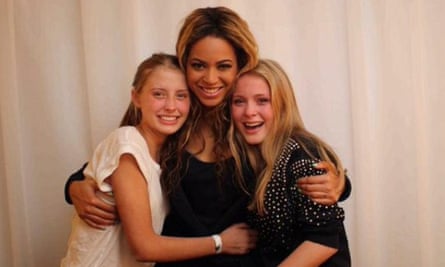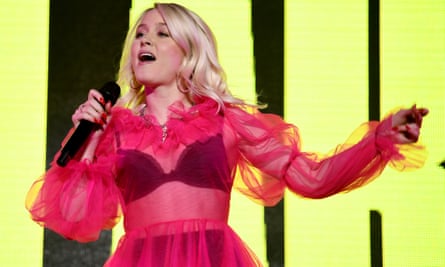While some artists are keen to cultivate the perfect video call mise-en-scene (“Oh, these coffee table art books? Love them!”), or tap up their stylist for designer loungewear, the Swedish pop star Zara Larsson doesn’t have time for that. Literally. “I didn’t know this interview was going to be on Zoom!” she apologises as she enters the chat five minutes late. It is 11am in Stockholm and Larsson is not camera-ready. However, rather than insisting we talk via her assumed communication medium – the humble telephone – she finds a comfy spot on her boyfriend’s sofa, scrapes back her unstyled hair and tightens the belt on her navy blue dressing gown. “This is what I look like 90% of the time now anyway,” she shrugs.
Larsson has been back in Stockholm since last March, after scrambling to put the finishing touches to her second album, Poster Girl, in LA. A 12-track collection of attitude-heavy, disco-tinged coming-of-age bangers featuring both the gonzo Atlanta rapper Young Thug and renowned Swedish production maestro Max Martin, the album deals with “kind of knowing what I want but at the same time definitely not”, AKA life as a 23-year-old.
It is the follow-up to 2017’s So Good, a debut that bottled Larsson’s sit-up-and-pay-attention innate pop star energy into zeitgeist-riding bangers that recalled early Rihanna, both in terms of sound and effortless attitude. Buoyed by the success of her sun-kissed smash Lush Life, which spent more than a year in the UK chart, and the 90s house throwback Never Forget You, it is the second most-streamed debut by a female artist ever on Spotify and recently went platinum in the US. Two of its spin-off collaborations – Girls Like with Tinie and the UK chart-topper Symphony with Clean Bandit – have helped earn Larsson four Brit award nominations.
But it wasn’t just gold-plated pop music that helped shift Larsson from web forum fodder to mainstream ubiquity. In 2015, as most pop stars’ social media accounts were calcifying into personality-free promo tools, one of Larsson’s Instagram posts – a picture showing her leg sheathed in a condom, mocking men who claimed they were “too big” to practice safe sex – went viral, and earned her a place in Time magazine’s 30 Most Influential Teens list. Her unfiltered Twitter account, meanwhile, has seen her being dragged into various “beefs”, from Chris Brown – who once called her “stinky butt” after she confessed to despising him – to, well, a large percentage of the global population.
“I had quite extreme opinions for some people, like when I said: ‘I hate all men,’” she explains, before admitting she was purposefully amplifying Twitter’s lack of nuance for extra controversy. “Because saying: ‘Hey, I hate toxic masculinity because it’s bad for both men and women blah blah,’ is just not a good-ass tweet.”
For someone whose job requires showing off, these “unprecedented times” have enforced a period of stillness and contemplation. Famous in Sweden since she won the TV talent show Talang (Sweden’s Got Talent, essentially) at the age of 10, Larsson says that, at first, the halt to touring gave her the chance to put her normally hectic schedule on pause (“I watched a lot of TV and had a lot of picnics,” she smiles). After a while, however, she was left feeling as if she had no purpose. “My identity is so tied to what I do,” she sighs. While Sweden’s herd immunity approach meant no lockdowns as such – “You’re allowed to go out, but you get shamed,” she laughs – she has also spent far more time indoors being bored than she’s used to. Even creating her own makeshift home studio didn’t help scratch her creative itch.

“I had Vogue coming over for their Perfect Night In feature and they were like: ‘Show me your studio,’ and I was like: ‘Yeah, totally,’ and I just couldn’t make any of it work. Someone had unplugged the keyboard and it took me 10 minutes to figure out how to do it all.”
While pop slowly starts to recover from the boom of the late-2010s’ acoustic-guitar-wielding “authenticity” brigade, Larsson, who once supported Ed Sheeran on tour, is more than happy to stake her claim as a classic pop entertainer. “Not everyone has to be, like,” – she slips into a gloriously pretentious “artist” voice – “‘Sometimes, when I don’t have anything to do, I take out my diary and I write songs.’”
She adds: “When I’m bored I put on my favourite pop songs and I stand in front of the mirror and I perform. I’m a performer before anything else.”
Larsson always knew she would be a star. Her parents – mother Agnetha is a nurse while her dad, Anders, was an officer in the navy – supported her early desire to perform, enrolling her in ballet lessons, but never expected she would be famous. A natural attention-seeker, Larsson would often perform a mini-concert at meal times, followed, at her dad’s behest, by the family debating the day’s big topics.“My dad thinks it’s important that everyone is heard, even if you don’t agree,” she says. “It gets scary when people are like: ‘This is the right opinion and if you have the wrong opinion you can’t say it.’” She pauses, something she does rarely. “I mean, in my opinion I’m always right.”

Beyoncé was an early musical idol and the pair met in 2013 after Larsson begged Beyoncé’s label to let her backstage after her concert in Stockholm. “I died,” she says. “When she came in the room I just laid on the floor and sobbed.” That one encounter was enough, however. “I’m not sure I want to meet her again,” she says. “I enjoy her being on a pedestal because she’s unreachable to me, like a mythical creature. I wouldn’t want her to be my friend … ” She roars with laughter at the audacity of the statement. “As if that would be an option!”
Poster Girl’s cover art, a neon pink fantasia featuring a bedroom wall covered in torn-out pictures, plays with this idea of Larsson as both the untouchable superstar idol and the everyday pop fan dreaming of stardom. “This is what I usually look like,” she says glancing at her dressing gown, “and I love that, but I also love the show. I love the glitter, the glamour, the lights, the big hair, and that’s also part of who I am.” Like Beyoncé, Larsson had been laser-focused in achieving her dreams. After she won Talang in 2008, she went to the US to take meetings with record labels. “I was like: ‘Boom, when are we doing the album? When are we shooting the videos?’ But I didn’t get signed and I was fucking devastated.” Two years later, still only 14, she signed her first deal – “I thought that was 14 years too late!” she laughs – and enjoyed homegrown success with her Sweden-only debut album, 1, an endearing collection of youthful pop that hinted at what was to come.
After Lush Life made her a superstar in 2016 (it currently sits on 945m global Spotify plays), Larsson found herself undermining her own success. “I’m a very dissatisfied person, which is a blessing and a curse; it makes me push for better things but it also means I can never be in the moment and enjoy something,” she says. “For example, I thought I’d be doing stadiums by now.” This constant strive for perfection can lead to second guessing, which is one of the reasons for Poster Girl’s protracted gestation.

Last year, Little Mix released Sweet Melody, a song Larsson had originally recorded for the album. Her frustrating flip-flopping on whether or not to keep it eventually saw its songwriters take it back and the song slip from her grasp. In January, it topped the UK chart. When I point out that Little Mix have blitzed through two albums in that same four-year timeframe, Larsson gets downcast for the first time in our interview. “It’s easy to sit and think: ‘Ah, fuck, I could have done more albums in this time,’ but it just didn’t feel right at that point,” she says.
Slowly, however, she is starting to release the pressure. “Sometimes my manager has to remind me: ‘We’re not going to Mars, we’re doing a pop album.’ It might be a big part of people’s lives, but it shouldn’t feel like the end of the world.”
That more level-headed mindset is also being applied to Larsson’s lively social media presence. She brings up episode nine of acclaimed TV drama I May Destroy You, in which Michaela Coel’s character pivots to outspoken social media celebrity in an attempt to forge an identity. “She does that almost as a defence mechanism in a way. I’m really happy that I felt those strong emotions and I think I became louder the more hate I got, which is natural. I’m a feminist, I want equality, and I don’t see how anyone can argue with that, but they do. The older I get, however, the more I realise it’s about having a civil conversation. Something in me now just can’t feel as mad [at ignorance] as I used to be.”

Rather than single out individuals for her ire, she says 2021 “is going to be the year I talk about issues and problems”. She recently posted about Poland’s abortion ban to her 6 million Instagram followers, captioning a picture with “You can NEVER ban abortions. You can only ban SAFE abortions.” Even when she was talking about Chris Brown – in 2009, Brown pled guilty to felony assault of his then girlfriend, Rihanna – or Dr Luke (Larsson scrapped songs made with the producer for So Good in light of sexual assault allegations made against him by Kesha, which he denies and is suing Kesha for defamation over), she is adamant she was always making broader points. “Why is it that Chris Brown can just be abusive towards women? Why does nobody listen to a woman who says she experienced abuse?”
Dr Luke’s recent public resurgence via a Grammy nomination for his production work on the rapper Doja Cat’s Say So didn’t surprise her. “Of course that only seems to happen with men. Janet Jackson showed a nipple [at the 2004 Super Bowl] and she was gone for ever. It’s wild.”
Besides, Larsson doesn’t want to have the time to sit around debating people on Twitter all day. While she’s “super-proud” of Poster Girl, and teases a forthcoming deluxe version that may include a long-discussed Ariana Grande collaboration, she is also keen to move on. “Mentally, this album is something that I need to get over and done with, in a way,” she says. “It’s been around for such a long time and I feel a lot of pressure. I want to get it out there, have people say: ‘Yay, it’s good,’ and be like: ‘Phew, I’m back.’” In fact, she has already started recording the next one. “We’re on a roll, baby. I’m not stopping.”
First things first, though – time to get dressed.
Poster Girl is released 5 March
